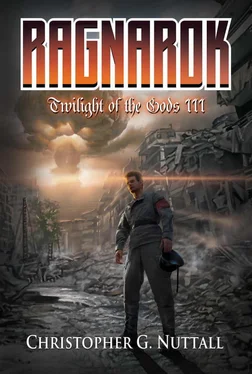“Don’t get caught by the traitors,” his superiors had warned. “They’re not taking prisoners.”
They kept moving, driven onwards by the grim knowledge that the only way to survive was to reach friendly lines. But where were the friendly lines? Hennecke thought they were moving east — he’d lost his personal compass somewhere in the retreat — but what if he was wrong? They could be moving north or south… And yet, the devastation surrounding him — the destroyed villages, the shattered roads — suggested that they were on the right track.
But he hadn’t seen anyone outside his group for days.
Another farming village loomed up in front of him. Common sense suggested they should walk around it, but he was too tired to care. The village had been wrecked as thoroughly as the previous village, save for the church. It stood alone, surrounded by ruined buildings and piles of blackened debris; outside, a dozen men and women dangled from ropes, their decomposing bodies suggesting they’d been hanged weeks ago. He shuddered, even though he’d seen worse horrors during the advance westwards. Who knew why the villagers had been hanged? And who knew who’d done it?
He didn’t bother to issue orders. In truth, he was unsure if any of his companions would follow them. Instead, he walked straight into the church and looked around. It felt oddly peaceful, despite the horrors outside; he had to fight the urge to just slump down in one of the pews and collapse. There were few churches in Germany East — he’d certainly never been in one — but, just for a moment, he could understand why the religious took comfort in them. And then he started to search the building, looking for food or drink or something they could use to survive.
“Nothing,” he said, twenty minutes later. “Nothing at all.”
He shook his head, bitterly, as they made their way back into the cold afternoon. Perhaps it was just his imagination, but the air felt colder, as if winter was coming early. German citizens were meant to keep emergency supplies somewhere within reach at all times — it was something the Nazi Party taught in schools — yet the church had been bare. But then, the coddled folk of Germany Prime felt safe . They had no reason to believe that they might have to fight for their lives at any moment, that they might be attacked… let alone that the entire country might be attacked. The risk of nuclear war had declined, hadn’t it?
And so they stopped building shelters and worrying about life after the blast , he thought, bitterly. And so they turned on the guardians of the Reich .
He swallowed, hard, as he heard an aircraft high overhead, but when he looked up he saw nothing. A friendly aircraft, perhaps? Hiding within the looming clouds? Or an enemy aircraft hunting for panzers to plink from the sky? He’d heard whispers about entire SS panzer divisions wiped out by enemy aircraft, whispers he’d studiously ignored. But now, all of a sudden, those whispers seemed all too plausible.
Gritting his teeth, he peered into one of the ruined buildings. Someone had already been through it, he realised; they’d torn through a shattered wardrobe, taking clothes and whatever else they could find in a desperate bid for survival. The only remaining clothes were clearly designed for a teenage girl. Normally, he would have been reluctant to wrap them around his body — there was no hope of actually putting them on — but now there was no choice. The laws against cross-dressing — cross-dressers were automatically sent to the camps — were no longer important. All that mattered was staying alive long enough to reach friendly lines.
“Bitch,” one of his companions muttered.
He held up a pair of blue jeans, clearly intended for someone a great deal slimmer than the average stormtrooper. Hennecke felt his lips thin in cold disapproval. There was no shortage of clothes from the textile combines in Germany East, but whoever had owned the jeans had preferred to buy American-made clothes off the black market. The single pair in the house — he pretended not to see his companion stuff the jeans into a bag — had probably cost more than everything else in the wardrobe put together. He knew precisely what his father would have said — and done — if he’d caught Hennecke or any of his siblings with American clothes, but their family lived in Germany East. They knew, all too well, just how cruel and uncaring the world could be.
And besides, buying American clothes helps them to fund wars against the Reich , he thought.
He took one last look at the remaining clothes, then led the way outside. There was no way to know what had happened to the original owner. She might have been evacuated by the rebels, she might have hidden somewhere in the countryside… or she might have been rounded up and shipped to the camps by the loyalists. Or she might have been raped and murdered by prowling stormtroopers. Rape was officially forbidden, but discipline had been breaking down even before the retreat from Berlin. The Waffen-SS hadn’t known what to do with a rebellion and a civil war, rather than yet another pacification campaign.
Let us hope she made it out safely , he thought.
He was too tired to be angry with her, really. No one had really expected a civil war, not when the Reich had held together since 1933. Everyone knew the Reich would last a thousand years. But now, old certainties were falling everywhere. No one knew their place any longer. Soldiers were turning on their officers, workers were turning on their managers, women were turning on their husbands, collaborator governments were starting to savour the taste of freedom… nothing was the same any longer. And, no matter who won the civil war, it was hard to imagine things going back to the way they were before the rebellion. The old certainties were gone .
Darkness was falling when they finally walked into friendly lines. A handful of stormtroopers, looking reassuringly competent rather than refugees; a couple of armoured vehicles, hiding under camouflage netting; an officer, looking as though he was definitely in command. Hennecke was relieved, even though he rather doubted the officer had experienced the maelstrom of Berlin. He had the supercilious air of a man who hadn’t had his confidence knocked out of him.
“ Heil Holliston ,” Hennecke managed. “ Herr Sturmbannführer .”
The Sturmbannführer looked him up and down for a long moment. Hennecke realised, in a flash of sudden horror, just how awful he must look. He was a Hauptsturmführer , yet he couldn’t be said to have taken command or done anything, really, apart from lead a handful of men to safety. But he’d lost touch with his unit during the retreat…
“ Heil Holliston ,” the Sturmbannführer returned. His gaze moved to the other men. “Go to the tent, report to the officer there. You’ll be fed, watered and assigned to new units.”
Hennecke felt cold. The Sturmbannführer spoke of stormtroopers as if they were animals…
He watched his men go, suddenly wishing he’d never been promoted. It had been a battlefield promotion, the kind of promotion he’d dreamed of before he’d discovered what it entailed. He’d led men into battle; he’d watched them die, even as he’d been spared himself… going back to the ranks would be a demotion, but he would almost welcome it. The war hadn’t been what he’d been promised. It had never been what he’d been promised.
“You should have taken command,” the Sturmbannführer said, coldly.
Hennecke said nothing. He knew the Sturmbannführer was correct. He’d outranked everyone else in the little group. He could have issued orders, he could have done… done what? There had been nothing he could have done, save for continuing the retreat until they reached friendly lines. But they’d shuffled into the lines like Untermenschen slaves doing their best to avoid a full day’s work. His men had looked pathetic…
Читать дальше












